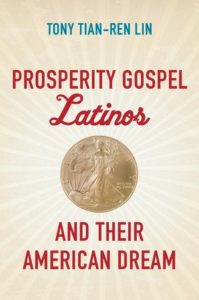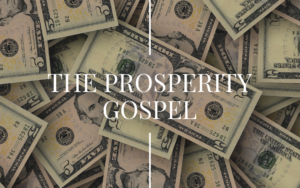Latino Immigrants and the Promise of the Prosperity Gospel
A book excerpt from Prosperity Gospel Latinos and Their American Dream
The following excerpt comes from Tony Tian-Ren Lin’s book Prosperity Gospel Latinos and Their American Dream (Copyright © 2020 by the University of North Carolina Press. Used by permission of the publisher. www.uncpress.org). The book explores the rising popularity of Prosperity Gospel Pentecostalism among Latino Americans.
This excerpt comes from the book’s conclusion, “The Dream of Meritocracy.”
***
“Dios es bueno, hermanos,” Paulina said, as she took the microphone from Pastor Gielis and stood behind the pulpit. “God has been so . . .” she choked back tears as “Amens” echoed through the congregation in support and encouragement. “God has been so good to me. I have received more than I ever could have imagined. He has given me more than I could have ever asked for.” The congregation waited in silence as Paulina prepared to give her testimony.
 Over two years passed since I first entered the world of Prosperity Gospel Pentecostals through Iglesia Cristiana del Padre in Charlottesville, Virginia. I had been invited back to attend a special service as the church inaugurated its new and larger location. The church’s place of worship was no longer a converted warehouse. An African American congregation was renting their space to Iglesia Cristiana del Padre in the late afternoons on Sundays. Paulina was honored with the opportunity to give her testimony at this special occasion. She stood before the congregation of over a hundred people. Many guests had come to celebrate. The room was full, and there were also children in the rooms adjacent to the meeting area. Unlike the original services I attended, Iglesia Cristiana del Padre now had simultaneous English translation for every part of the service because it was now an “international” ministry. Headphones were provided for all non-Spanish speakers, as the service was still unapologetically in Spanish. Paulina stood, full of emotion, yet confident, wearing a tan designer pantsuit; the original tag was still attached to one of the sleeves, perhaps intentionally to show the expensive brand. She looked out on the congregation while composing herself, then began to tell the congregation of her humble upbringing in Colombia.
Over two years passed since I first entered the world of Prosperity Gospel Pentecostals through Iglesia Cristiana del Padre in Charlottesville, Virginia. I had been invited back to attend a special service as the church inaugurated its new and larger location. The church’s place of worship was no longer a converted warehouse. An African American congregation was renting their space to Iglesia Cristiana del Padre in the late afternoons on Sundays. Paulina was honored with the opportunity to give her testimony at this special occasion. She stood before the congregation of over a hundred people. Many guests had come to celebrate. The room was full, and there were also children in the rooms adjacent to the meeting area. Unlike the original services I attended, Iglesia Cristiana del Padre now had simultaneous English translation for every part of the service because it was now an “international” ministry. Headphones were provided for all non-Spanish speakers, as the service was still unapologetically in Spanish. Paulina stood, full of emotion, yet confident, wearing a tan designer pantsuit; the original tag was still attached to one of the sleeves, perhaps intentionally to show the expensive brand. She looked out on the congregation while composing herself, then began to tell the congregation of her humble upbringing in Colombia.
She was uneducated and married very young. Her husband was physically and emotionally abusive. She was kept at home under the threat of violence while her husband was out womanizing. Life proved too much for young Paulina, and she tried to end it. She attempted suicide twice, at least once by slitting her wrists. She was found by a neighbor and saved in the nick of time. After each suicide attempt, her husband treated her better, but he soon went back to his old ways. When her daughter was born, Paulina realized that there was no future for them in Colombia. If her abusive husband did not kill her, she would have killed herself in another suicide attempt, leaving her daughter behind. She had no hope her husband would change, yet her family, steeped in the “machista” culture, had taken her husband’s side; they believed she should quietly serve him and raise their daughter without complaint. This was not surprising, since her father had behaved the same way toward her mother. One day, with the help of her sister in Virginia, she took her daughter and got on a plane. Mother and daughter landed in Washington, D.C., and were immediately driven to a town outside Charlottesville.
Paulina’s new life did not begin once she arrived in the States. Life was still hard. She lived in her sister’s trailer with her sister’s boyfriend and their three children. The place was crowded, and her sister pressured her to get a job. She also suggested that Paulina go to Iglesia Cristiana del Padre, where she heard new immigrants could receive help. And so, on her first Sunday in America, she did something she had never done before: she attended a Prosperity Gospel Pentecostal church. At the end of the service, unsure of what to do but extremely moved by the experience, she naively walked to the front when Pastor Gielis asked those who had a need to come forward. She did not know the Pentecostal tradition and was unaware that this was the time for healings and miracles. She recounted what happened when she walked up to Pastor Gielis:
The moment he put his hands on me, I fell to the ground and it was as if everything I had been carrying was lifted up. All the abuse I had endured, all the poverty I experienced, all the negative things, the stress, the fear, the anger, all the bad things were lifted up. And I felt loved. I felt that I was loved for the first time in my life! I wanted to give my life to the God who loved me like that, and I did. I gave my life to God; me and my daughter, we both gave our lives to God on that day. When we did that, our new lives began. The curse of the past was destroyed forever. Since then, I have been blessed with prosperity and abundance.
By almost any measure, Paulina has clearly been blessed with prosperity, and I have chronicled her rise from rags to riches. It was only my second week at Iglesia Cristiana del Padre when Paulina and her daughter, Gabriela, arrived at the church for the first time. I remember briefly meeting the shy and confused woman with a young daughter so scared that she would not leave her mother’s side to go with the other children. I wrote about them in my field notes, especially recording the distinctiveness of their humble Colombian village clothes. Their ignorance of Pentecostal church practices and mannerisms also made them stand out. The members of the church were welcoming and intentional about making them feel included. On her first Sunday, Paulina was quickly ushered to the area where other single mothers were sitting with their children, and the wives of the leaders of the church quickly sat around her.
Now, after two years, Paulina was standing on that pulpit as an exceptionally different woman.
 She has bought a car, pays her own rent, and manages two other women in the home-cleaning business she started. Her daughter, who had grown into an outgoing thirteen-year-old, spoke English fluently (even better than her Spanish), wore only brand-name clothing, and sent text messages to her friends on her heavily decorated smartphone. Most importantly, Paulina now had a title in the church. She was a teacher, the highest rank endowed on a woman with her credentials (single mother and lower middle class). This title allowed her to take up the offering, help teach Bible studies (but not by herself), counsel other church members, and speak before the whole congregation at length, as she was doing on that special Sunday. She also traveled with Pastora Veronica, leading workshops and retreats for women titled La Reina en Ti (The Queen in You), La Belleza de Adentro Hacia Afuera (The Beauty Inside Facing Out), and Aprende tu Destino por la Obediencia (Learn Your Destiny Through Obedience). A brochure at the back of the church promoting La Reina en Ti stated that the day would be spent in “practical teaching for today’s women. Learning about finances, self-esteem, marriage, the Last Days, and much more.” Most importantly, the women of the church looked up to Paulina because she held the title of teacher. This form of social capital raised her status significantly; she was endowed with dignity and respect.
She has bought a car, pays her own rent, and manages two other women in the home-cleaning business she started. Her daughter, who had grown into an outgoing thirteen-year-old, spoke English fluently (even better than her Spanish), wore only brand-name clothing, and sent text messages to her friends on her heavily decorated smartphone. Most importantly, Paulina now had a title in the church. She was a teacher, the highest rank endowed on a woman with her credentials (single mother and lower middle class). This title allowed her to take up the offering, help teach Bible studies (but not by herself), counsel other church members, and speak before the whole congregation at length, as she was doing on that special Sunday. She also traveled with Pastora Veronica, leading workshops and retreats for women titled La Reina en Ti (The Queen in You), La Belleza de Adentro Hacia Afuera (The Beauty Inside Facing Out), and Aprende tu Destino por la Obediencia (Learn Your Destiny Through Obedience). A brochure at the back of the church promoting La Reina en Ti stated that the day would be spent in “practical teaching for today’s women. Learning about finances, self-esteem, marriage, the Last Days, and much more.” Most importantly, the women of the church looked up to Paulina because she held the title of teacher. This form of social capital raised her status significantly; she was endowed with dignity and respect.
In her testimony, Paulina was intentional in shedding light on the details of how she procured her blessings from God. She explained how this church and Pastor Gielis specifically taught her about the biblical principles of finance and God’s will to have her prosper. As she learned the Prosperity Gospel formula, Paulina began to tithe even though she was earning little and was dependent on her sister and her boyfriend for many of her basic needs.
But more prosperity came to her as she “stepped out in faith,” taking risky actions in the Prosperity Gospel formula. Her first act of faith was moving out of her sister’s apartment. She explained that she had to move out because her sister “was living in sin” with her boyfriend, and God would not allow her to prosper her if she remained in that situation. She took a risk and signed a lease for her own apartment, and according to her testimony, she was soon blessed with many cleaning jobs, which helped her afford the rent. Paulina attended every Sunday service, Bible study, and prayer meeting at Iglesia Cristiana del Padre, and was an active participant in all the activities of the church. As she received more cleaning work, she began hiring other women to help with the business—first one person, then another. Her economic status began to rise. These younger women looked up to her as their boss. She spoke of generous bonuses she would receive from clients, always at a time when she needed it the most, always as an answer to her prayers, and always a direct result of her acts of faith.
 Paulina had truly come a long way in only two years. She was confident, happy, and, compared to two years before, rich. But that is not why Paulina was asked to give her testimony on that particular Sunday. The sacrifices and acts of faith had earned her something: the greatest dream for many of the members of that church, and almost every undocumented immigrant. As Paulina was finishing her testimony, she pulled out a piece of paper from her Bible. It was a letter-size sheet of light green paper with a hint of pink on it. She carefully unfolded it and held it up to the congregation in silence. Then she said: “Hermanos, God is good to me. God is good to us. He listens to our prayers. He gives us more than we can imagine. I had everything I needed. He has already blessed me with prosperity. But last week I got this letter in the mail. My [immigration application] papers have been approved! They have been approved! God has blessed me with my [legal immigration] papers! I will be a citizen in this country!”
Paulina had truly come a long way in only two years. She was confident, happy, and, compared to two years before, rich. But that is not why Paulina was asked to give her testimony on that particular Sunday. The sacrifices and acts of faith had earned her something: the greatest dream for many of the members of that church, and almost every undocumented immigrant. As Paulina was finishing her testimony, she pulled out a piece of paper from her Bible. It was a letter-size sheet of light green paper with a hint of pink on it. She carefully unfolded it and held it up to the congregation in silence. Then she said: “Hermanos, God is good to me. God is good to us. He listens to our prayers. He gives us more than we can imagine. I had everything I needed. He has already blessed me with prosperity. But last week I got this letter in the mail. My [immigration application] papers have been approved! They have been approved! God has blessed me with my [legal immigration] papers! I will be a citizen in this country!”
The congregation broke out in “hallelujahs” and “Amens,” and the band began to play as an impromptu party broke out in the church to celebrate this announcement. Omitted in her testimony was the fact that Paulina’s sister had previously been married to a U.S. citizen and received her citizenship years ago. She applied for Paulina’s legal residency before she came to the United States, but it was only recently approved. This did not mean that Paulina would get her residency card right away. The letter, which she showed me later, was legitimate. It stated that her application had been approved, but she would have to wait for an interview, which could be a long time coming. Plus, Paulina had to wait six years after receiving her residency status before she could apply for U.S. citizenship. But those details were irrelevant on this day. She held in her hand an official letter from the U.S. Citizenship and Immigration Services office declaring that her application had been approved. She would one day be a citizen of the United States of America. It did not matter how long she had to wait, because patience was part of the formula she employs regularly. As the congregation settled down, Paulina announced a final proclamation to her testimony: “Tomorrow, Pastora Veronica and I will be searching for homes with sister Yolanda (a real-estate agent). I dreamt about this before, but I dream no more because my dreams have come true!” The congregation broke out in applause and cheers. Having received her papers for legal residency, Paulina will take the greatest step toward achieving her American dream—home ownership—the ultimate visible sign of her invisible blessings.
Paulina’s story is rare, and is not the norm for most immigrants. Most do not obtain legal residency in this way—or at all. The fact that her non-Christian divorced sister was central in Paulina obtaining her residency was not mentioned in the testimony. It was only God, and God received all the credit. Yet the few wealthy people in the church are always lifted up as examples to the congregation. Her testimony was offered as an encouragement to the rest of the congregation: if they remain faithful to the formula, they too can achieve what Paulina did.
Tony Tian-Ren Lin is Vice President of Institutional Advancement and Research at New York Theological Seminary.
***
Interested in more on this topic? Check out episode 12 of the Revealer podcast: “Latino Americans and the Popularity of Prosperity Gospel Pentecostalism” with Tony Tian-Ren Lin.